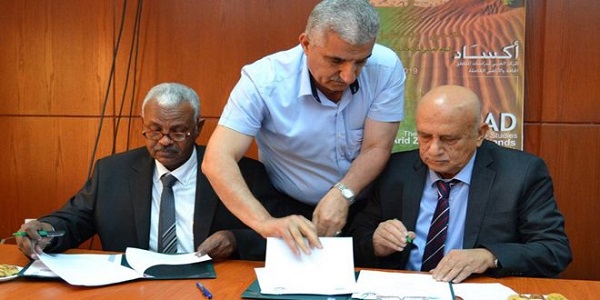DAMASCUS- The Arab Center for the Studies of Arid Zones and Dry Lands (ACSAD) and the Sudan Ministry of Agriculture and Forestry signed a memorandum on the receipt of the first phase of the “100 million hectares of optimal land use project of the Republic of Sudan” implemented by ACSAD in cooperation with the concerned Sudanese authorities in the fields of agriculture and irrigation.
The memorandum was signed by the Minister of Agriculture and Forestry of the Republic of Sudan, Eng. Babeker Othman Mohamed Ali, and the Director General of ACSAD, Dr. Rafiq Ali Saleh.
Dr. Saleh said that the phase that has been implemented includes the states of Khartoum, Nile and the North, pointing out that the studied areas in these states is about 40 million hectares.
He pointed out that the study includes the reality of livestock, vegetation cover, cultivated crops, fruit trees, pastures and forests, noting that the study has developed a vision for the future investment in these states.
Mr. Saleh said the study included the preparation of more than 600 maps of the regions of these states.
For his part, the Minister of Agriculture and Forestry of Sudan highlighted this great scientific achievement, expressing Sudan’s appreciation for the projects already carried out by ACSAD in the areas of wheat, barley, maize, conservation agriculture and livestock development, especially sheep, goats and camels also in the fields of palm cultivation development and water resources studies Water Resources.
He pointed to the role played by ACSAD in the implementation of agricultural development projects in different regions in Sudan, pointing out that ACSAD, which seeks to achieve Arab food and water security, has in recent years become one of the most important Arab joint action organizations.
The Sudanese delegation headed by the Minister of Agriculture ended a week-visit to the headquarters of the center of the ACSAD in Damascus, during which he toured the stations of ACSAD in Homs, Banias and Lattakia.
Sh. Kh.

